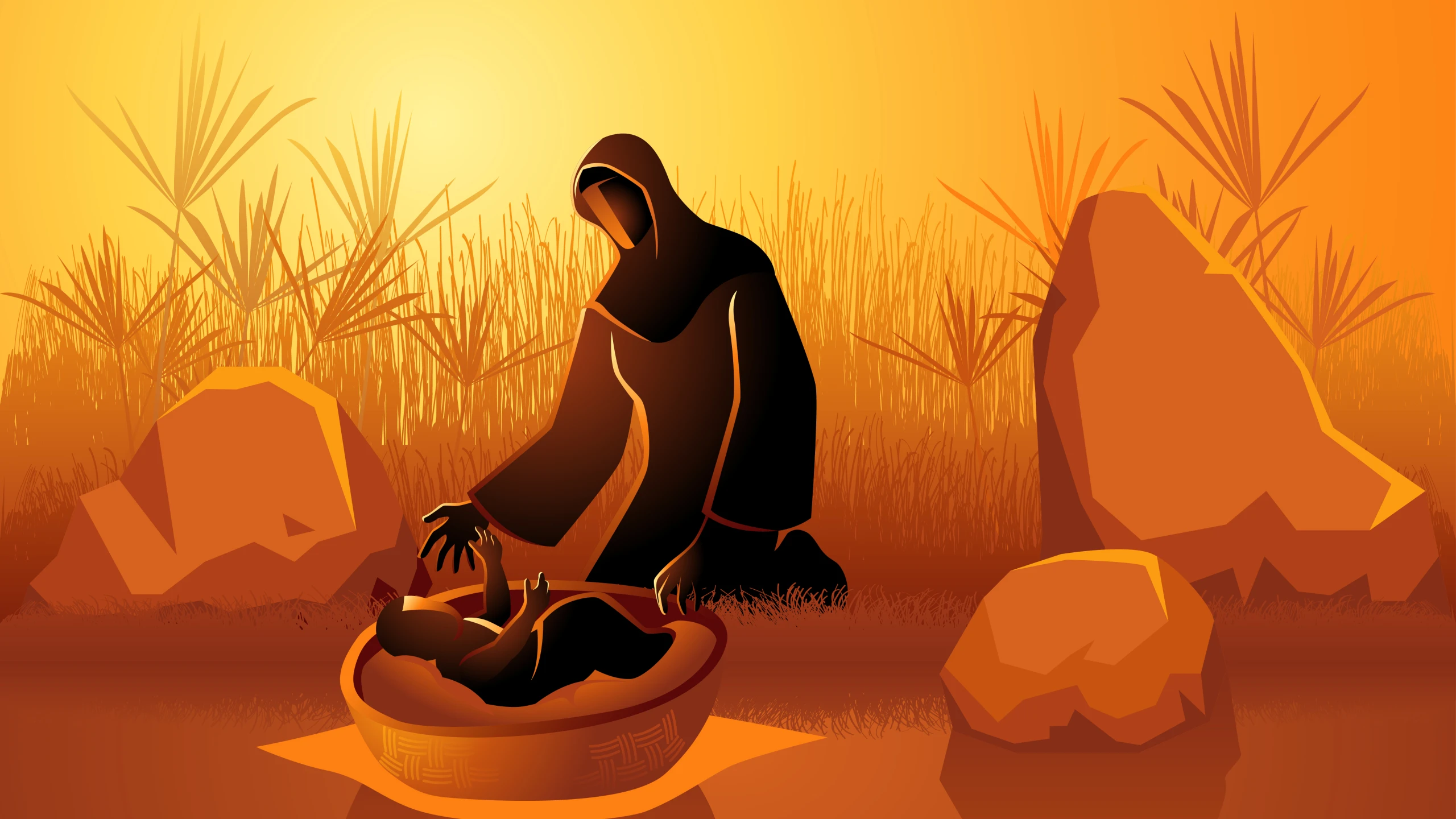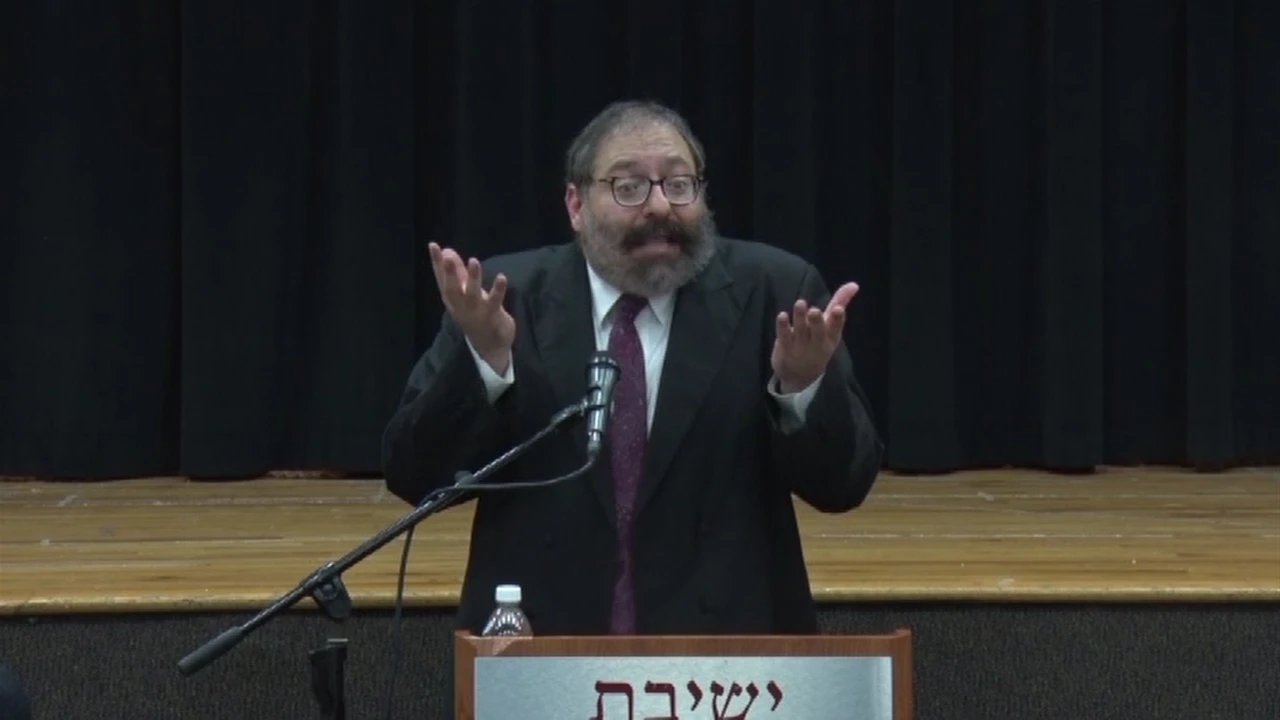The Two Faces of Your Spouse
Why Is Marriage Compared to the Splitting of the Sea?
- January 9, 2011
- |
- 4 Sh'vat 5771
Rabbi YY Jacobson
6057 צפיות
By Eugene Ivanov

The Two Faces of Your Spouse
Why Is Marriage Compared to the Splitting of the Sea?
Rabbi YY Jacobson
- January 9, 2011
The Inside and the Outside
A wealthy Jewish man buys a fabulous home in Beverly Hills, California. He brings in a local workman to decorate the place. When the job is finished, the homeowner is delighted but realizes that he's forgotten to put mezuzahs on the doors (a mezuzah is usually a small wooden box containing within it a few sections of the Bible, that is put up on the doorposts of Jewish homes).
He goes out and buys 50 mezuzahs and asks the decorator to place them on the right-hand side of each door except bathrooms.
When he comes back a few hours later he sees that the job has been carried out to his satisfaction. He is so pleased that he gives the decorator a bonus. As the decorator is leaving he says, "By the way, I took out all the warranties in the little boxes and left them on the table for you!
The Miracle of Matchmaking
The seventh day of Passover celebrates the anniversary of the story related in Exodus (in the Torah portion Beshalach) when at the brink of being captured by the mighty Egyptian forces, the Red Sea parted before the Jewish people. The newly born nation of Israel crossed to the other side and embarked on its journey to freedom.
Do we have anything in our lives today that could even remotely reflect that unparalleled and stupendous miracle? Yes, says the Talmud, and it is the miracle of a marriage that works. "To match couples together is as difficult as the splitting of the sea," states this ancient Jewish text written around 1700 years ago[1].
What is the meaning behind these words? Everybody knows that the process of finding a life partner and maintaining the relationship may at times be excruciatingly difficult. But why, from all extraordinary miracles described in the Torah, does the Talmud choose specifically the miracle of the splitting of the sea to depict marriage?
Joseph's Casket
King David, in an exhilarating poem describing the exodus from Egypt[2], sums up the event of the splitting of the sea in brief words: "The sea saw and fled."
"What did it see?" asks the Midrash[3]. "The casket containing the remains of Joseph," is the answer of the sages. The sea, explains the Midrash3, refused to part for the Jewish people. Only when it was shown the casket containing Joseph's bones did the sea acquiesce and part.
Why did the sight of Joseph's casket compel the sea to flee from its place, making way for the Jews? Says the Midrash, "The sea remembered how Joseph fled from his master's wife who was seeking to violate him[4]; the sea decided it would flee, too."
Yet there is something profoundly amiss here. The Midrash and the Zohar state[5] that the original creation of the sea was conditional upon its splitting for the sake of the Jewish people when they would escape the Egyptians, 2,448 years later. The sages teach that G-d made it clear with the sea that if it did not agree to change its nature at the moment of calling, He would not bring it into existence[6]. If that was the case, how did the sea breach its original agreement and refuse to split for the Jewish people until it saw the casket of Joseph?
Why did the sea need to observe Joseph's casket in order to split, when this act of splitting was an old deal etched in stone at the moment of its creation? Another question is, what was it about the righteous act of Joseph that affected the sea more than all the other noble and moral deeds performed by any of the Jews standing at the sea?
A Tale of Two Jews
The answer to all of these questions may lie in a stirring insight made by the saintly Chassidic master, Rabbi Aaron of Karlin[7].
When G-d cut the initial deal with the sea that it split before the Jewish people, the sea -- like any good businessman would do -- asked G-d to see one of those "Jews" for whom it would need to change its nature and split its "identity" many years down the line.
When the sea observed the souls of the Jews in heaven, it melted away in joy and ecstasy. Observing the unparalleled greatness and untold depth of a Yiddishe Neshamah, of that Divine spark embodying the goodness, holiness, dignity, and G-dliness of its Creator, the sea declared to G-d, "If it is for these souls that I need to split, it would be my greatest honor and pleasure. For these souls, I'd remain split for 1,000 years. These are my type of guys."
That occurred during the time of creation, when the sea observed the souls of the Jewish people still in heaven, before they have made that quantum leap to descend into the physical world.
Now, let us travel forward 2,448 years.
The Jews have just left Egypt, after spending 210 years in the most morally depraved society on earth. For more than half of that time they were enslaved, abused, and tortured. Now, upon liberation, they are exhausted, devastated, and broken.
Seven days after their exodus, they are caught between the approaching Egyptians behind them and a large sea in front of them. After all the darkness and pain they have experienced, at the moment when they think their moment of liberty has arrived, they find themselves trapped between a cruel army and an indifferent sea.
At that moment, the Torah records[8], the people of Israel were overtaken by fright, and they began to holler. "They said to Moses," writes the Torah, "Were there no graves in Egypt so that you needed to take us out to die in the Wilderness? What is this that you have done to us to take us out of Egypt? Is this not the statement that we made to you in Egypt, saying, 'Let us be and we will serve Egypt, for it is better that we serve Egypt than die in the Wilderness!'"
In a very psychologically insightful interpretation, the Talmud relates[9], that the Jews at the time, horrified and frightened, divided into four groups, each calling for another plan of action. The first group advocated suicide, the second group wanted to surrender to Egypt. A third group pushed for all-out war, while a fourth group suggested they begin to pray. Moses rejected all of the groups. He quoted G-d as saying[10], "Speak to the children of Israel and let them move on."
It was in this climate that the sea was now called upon to fulfill its longstanding obligation. According to Rabbi Aaron of Karlin, at this moment dialogue emerged.
"Why?" asked the sea. "Why should I split"?
"The Jews. They have, at last, arrived," came the answer. "It is time to fulfill your promise."
"Who arrived?" asked the sea.
"The Jews. Don't you see them right in front of you?"
"No, I don't," said the sea.
"What do you mean you don't see them? Look, they are standing right in front of you. All two million of them!"
"Sorry, but these are not the same people I have observed in the past. These are not the same souls I saw in heaven 2,448 years ago. The souls I saw then were limitless in their depth, splendid in their dignity, glorious in their spirit. They constituted sheer celestial beauty. These people in front of me are grouchy, frustrated, divisive, filled with anger, fear, and a negative attitude."
The sea refused to part. Notwithstanding the agreement, the sea would not split. The sea claimed it was deceived: The Jews of heaven were not the Jews on earth. The sea had agreed to split before rich spirits; not before impoverished people.
Until... until it saw the casket of Joseph.
Who Was Joseph?
"Joseph recognized his brothers but they did not recognize him," says the Torah[11]. When his brothers, the tribes of Israel, descended to Egypt to purchase food, and they encountered their estranged brother who has since risen to become viceroy of the land, he recognized them but they did not recognize him.
But why? The Chassidic masters explain that Joseph's depth of morality and holiness was concealed behind the dense facade of an Egyptian statesman.
On the outside, Joseph seemed no more than a tremendously handsome young man, charming and charismatic, skilled as a diplomat and politician with endless ambition. It was not easy to realize that beneath these qualities lay a soul on fire with spiritual passion, a kindred spirit for whom the moral legacy of Abraham, Isaac, and Jacob remained the epicenter of his life; a heart in love with G-d.
Joseph easily identified the holiness within his brothers. After all, they lived most of their lives as isolated, spiritual shepherds, involved in prayer, meditation, and study. Yet these very spiritual brothers lacked the ability to discern the Divine dignity etched in the depth of Joseph's heart. They never understood who their brother really was.
Even when Joseph was living with them in Israel, they saw him as an outsider, as a danger to the integrity of the family of Israel. They saw him as a worldly politician dreaming of power and fame. Certainly, when they encountered him in the form of an Egyptian leader, they failed to observe that beyond the mask of a savvy politician lay the soul of pristine nobility.
This dual identity that characterized Joseph's life played itself out in the most powerful way when his master's wife attempted to seduce him into intimate relations. On the outside, she thought, it would not be very difficult to entice young Joseph into sacrificing moral integrity for the sake of tremendous fun and gratification that would secure him a glorified position in the home of his master.
But, when push came to shove, when Joseph was presented with the test of tests, he displayed heroic courage as he resisted and fled her home. As a result of that act, he ended up in prison for 12 years, without any natural hope of ever being liberated from this hellish prison.
The Sea Remembers
When the sea remembered the story of Joseph, it understood that it had erred.
Yes, the souls it had encountered in heaven were far greater and loftier than the exhausted humans it saw at its shore. But when the sea observed the life of Joseph it understood that it must not limit its vision to the external appearance of man, often flawed and distorted. It had to gaze deeply into the depths of the human spirit to encounter royalty.
In a way, Joseph's casket was whispering this message to the sea: When you gaze at another human being, do not make the same error that others make when they gaze at you. Some simple folks look at you, dear sea, and assume that there is nothing beneath your bed of water. But who better than you knows the truth, that underlying your facade of water, lies an entire exquisite universe! When the sea encountered Joseph's presence it understood its mistake. It grasped the truth that the great drama and beauty of human life lie not in our perfection and flawlessness, but rather in the human battle not to surrender to the external forces of darkness, despair, and shallowness and to remain loyal to the light, hope, and depth etched within.
Upon this realization, the sea parted before the Jews.
Do You Remember Your Groom?
Before each of us was born, say the sages, we were shown, in heaven, the souls of our respective grooms and brides.
Now, when you saw the soul of your future husband in the spiritual realms, you were ecstatic. You were witness to an extraordinary spirit, a towering beacon of light, a great personality. You thought to yourself: "For such a husband, I will do anything; I will be there for him in the deepest possible way; I am ready to 'split' for him any day."
Similarly, when you encountered your future bride there in the sublime plane, you were just blown away. What a profound heart! Will I truly have the privilege of building a home with this human being? How will I ever be able to show enough gratitude for the joy of having a relationship with this woman?
Then, you were born. Twenty, 25, 30, 35, 45 years later, you feel an attraction to your spouse, to that soul that you were once so overwhelmed you. You take a look... But you do not recognize him or her.
"Him? You want me to respect him?" many a woman says. "He is an obnoxious, egotistical, self-centered man."
"Her?" many a man exclaims. "You expect me to appreciate and honor her? A needy and insecure kvetch?"
Many of us fail to recognize in the face and personality of our spouses what we once-upon-a-time saw in their souls.
"To match couples together is as difficult as the splitting of the sea," states the Talmud. Marriage is the ability to recognize your true spouse, beneath the layers of "rubble" that may eclipse his or her true dignity and beauty.
A good relationship stems from the understanding that life is a battlefield in which we often stumble and fail and that the beauty and profundity of human life consist not of a continuous stream of light and perfection, but rather of the light that emerges from amidst darkness, of the serenity that emerges from turmoil, and of the harmony that sprouts forth from strife[12].
Or as Eliezar ben Nissan Hakohen put it in Anthem: "Forget your perfect offering. There is a crack in everything. That's how the light gets in."
__________________________
[1] Sotah 2a. The Talmud there, to be sure, is discussing second marriages. Yet in many sources, this metaphor is applied to first marriages as well. See for example Akeidas Yitzchak Parshas Vayeishev.
[2] Psalms chapter 114.
[3] Midrash Tehilim on the above-quoted verse in Psalms.
[4] See Genesis Vayeishev.
[5] Berishis Rabah 5:5; Shemos Rabah 21:6; Zohar vol. 2 p. 198b. Cf. Baal Haturim to Exodus 14:27.
[6] This is derived from the biblical narrative of the story (Exodus 14:27), "Moses stretched out his hand over the sea, and toward morning the water went back to its power." In Hebrew the words "to its power," l'eisano, can, with a minor play on letters, be read as "leatnaoi," which means "to its stipulation." In other words, the sea was created with a stipulation that at a certain point in time it would split. Now, obviously, a bed of water has no conscious will of its own. This statement of our sages, just like the ones that will follow, is to be understood as a metaphor. Every physical entity has a spiritual source, a "mazal," that does possess consciousness and awareness, and affects the properties of its physical counterpart.
[7] One of the greatest disciples of the Maggid of Mezrich and one of the most potent personalities of the Chassidic movement. He passed away at the age of 36, on Passover of the year 1772.
[8] Exodus Beshalach.
[9] Yerushalmi Pesachim.
[10] Exodus Beshalach.
[11] Genesis 42:8.
[12] An interesting tale: My esteemed senior colleague, Rabbi Dr. Alter Benzion Metzger, professor of Judaic studies at Stern College, was a young man searching for a bride when he wished to ask the Lubavitcher Rebbe for a blessing to find his "bashert." Not wishing that the people standing around the Rebbe should understand their private conversation, Dr. Metzger said to the Rebbe: "I am asking a blessing for the splitting of the red sea" (In the original Yiddish, "Eich bet a Beracah far Krias Yam Suf.") Without skipping a heartbeat, the Rebbe responded, "Akin to the splitting of the sea." (in the original language of the Rebbe: "Kekrias Yam Suf.") Superficially, the Rebbe was simply correcting a Talmudic quote that was misquoted by Dr. Metzger. The Talmud does not state that marriage is the splitting of the sea, but that it is "like," akin to the splitting of the sea. My personal feeling, however, is that this was indeed the Rebbe's unassuming way of bestowing his blessings. Finding your match, the Rebbe was saying, is not as difficult as the splitting of the sea; it is only akin to it but somewhat easier. Indeed, not long afterward did Alter Benzion encounter his lifelong partner, Mrs. Sarah Hershburg-Metzger.
My thanks to Shmuel Levin for his editorial assistance.- תגובה
סיכום השיעור:
The Two Faces of Your Spouse: Why Is Marriage Compared to the Splitting of the Sea?
Dedicated by David and Eda Schottenstein in the loving memory of Alta Shula Swerdlov. And in honor of their daughter Yetta Alta Shula, "Aliyah," Schottenstein.
The Inside and the Outside
A wealthy Jewish man buys a fabulous home in Beverly Hills, California. He brings in a local workman to decorate the place. When the job is finished, the homeowner is delighted but realizes that he's forgotten to put mezuzahs on the doors (a mezuzah is usually a small wooden box containing within it a few sections of the Bible, that is put up on the doorposts of Jewish homes).
He goes out and buys 50 mezuzahs and asks the decorator to place them on the right-hand side of each door except bathrooms.
When he comes back a few hours later he sees that the job has been carried out to his satisfaction. He is so pleased that he gives the decorator a bonus. As the decorator is leaving he says, "By the way, I took out all the warranties in the little boxes and left them on the table for you!
The Miracle of Matchmaking
The seventh day of Passover celebrates the anniversary of the story related in Exodus (in the Torah portion Beshalach) when at the brink of being captured by the mighty Egyptian forces, the Red Sea parted before the Jewish people. The newly born nation of Israel crossed to the other side and embarked on its journey to freedom.
Do we have anything in our lives today that could even remotely reflect that unparalleled and stupendous miracle? Yes, says the Talmud, and it is the miracle of a marriage that works. "To match couples together is as difficult as the splitting of the sea," states this ancient Jewish text written around 1700 years ago[1].
What is the meaning behind these words? Everybody knows that the process of finding a life partner and maintaining the relationship may at times be excruciatingly difficult. But why, from all extraordinary miracles described in the Torah, does the Talmud choose specifically the miracle of the splitting of the sea to depict marriage?
Joseph's Casket
King David, in an exhilarating poem describing the exodus from Egypt[2], sums up the event of the splitting of the sea in brief words: "The sea saw and fled."
"What did it see?" asks the Midrash[3]. "The casket containing the remains of Joseph," is the answer of the sages. The sea, explains the Midrash3, refused to part for the Jewish people. Only when it was shown the casket containing Joseph's bones did the sea acquiesce and part.
Why did the sight of Joseph's casket compel the sea to flee from its place, making way for the Jews? Says the Midrash, "The sea remembered how Joseph fled from his master's wife who was seeking to violate him[4]; the sea decided it would flee, too."
Yet there is something profoundly amiss here. The Midrash and the Zohar state[5] that the original creation of the sea was conditional upon its splitting for the sake of the Jewish people when they would escape the Egyptians, 2,448 years later. The sages teach that G-d made it clear with the sea that if it did not agree to change its nature at the moment of calling, He would not bring it into existence[6]. If that was the case, how did the sea breach its original agreement and refuse to split for the Jewish people until it saw the casket of Joseph?
Why did the sea need to observe Joseph's casket in order to split, when this act of splitting was an old deal etched in stone at the moment of its creation? Another question is, what was it about the righteous act of Joseph that affected the sea more than all the other noble and moral deeds performed by any of the Jews standing at the sea?
A Tale of Two Jews
The answer to all of these questions may lie in a stirring insight made by the saintly Chassidic master, Rabbi Aaron of Karlin[7].
When G-d cut the initial deal with the sea that it split before the Jewish people, the sea -- like any good businessman would do -- asked G-d to see one of those "Jews" for whom it would need to change its nature and split its "identity" many years down the line.
When the sea observed the souls of the Jews in heaven, it melted away in joy and ecstasy. Observing the unparalleled greatness and untold depth of a Yiddishe Neshamah, of that Divine spark embodying the goodness, holiness, dignity, and G-dliness of its Creator, the sea declared to G-d, "If it is for these souls that I need to split, it would be my greatest honor and pleasure. For these souls, I'd remain split for 1,000 years. These are my type of guys."
That occurred during the time of creation, when the sea observed the souls of the Jewish people still in heaven, before they have made that quantum leap to descend into the physical world.
Now, let us travel forward 2,448 years.
The Jews have just left Egypt, after spending 210 years in the most morally depraved society on earth. For more than half of that time they were enslaved, abused, and tortured. Now, upon liberation, they are exhausted, devastated, and broken.
Seven days after their exodus, they are caught between the approaching Egyptians behind them and a large sea in front of them. After all the darkness and pain they have experienced, at the moment when they think their moment of liberty has arrived, they find themselves trapped between a cruel army and an indifferent sea.
At that moment, the Torah records[8], the people of Israel were overtaken by fright, and they began to holler. "They said to Moses," writes the Torah, "Were there no graves in Egypt so that you needed to take us out to die in the Wilderness? What is this that you have done to us to take us out of Egypt? Is this not the statement that we made to you in Egypt, saying, 'Let us be and we will serve Egypt, for it is better that we serve Egypt than die in the Wilderness!'"
In a very psychologically insightful interpretation, the Talmud relates[9], that the Jews at the time, horrified and frightened, divided into four groups, each calling for another plan of action. The first group advocated suicide, the second group wanted to surrender to Egypt. A third group pushed for all-out war, while a fourth group suggested they begin to pray. Moses rejected all of the groups. He quoted G-d as saying[10], "Speak to the children of Israel and let them move on."
It was in this climate that the sea was now called upon to fulfill its longstanding obligation. According to Rabbi Aaron of Karlin, at this moment dialogue emerged.
"Why?" asked the sea. "Why should I split"?
"The Jews. They have, at last, arrived," came the answer. "It is time to fulfill your promise."
"Who arrived?" asked the sea.
"The Jews. Don't you see them right in front of you?"
"No, I don't," said the sea.
"What do you mean you don't see them? Look, they are standing right in front of you. All two million of them!"
"Sorry, but these are not the same people I have observed in the past. These are not the same souls I saw in heaven 2,448 years ago. The souls I saw then were limitless in their depth, splendid in their dignity, glorious in their spirit. They constituted sheer celestial beauty. These people in front of me are grouchy, frustrated, divisive, filled with anger, fear, and a negative attitude."
The sea refused to part. Notwithstanding the agreement, the sea would not split. The sea claimed it was deceived: The Jews of heaven were not the Jews on earth. The sea had agreed to split before rich spirits; not before impoverished people.
Until... until it saw the casket of Joseph.
Who Was Joseph?
"Joseph recognized his brothers but they did not recognize him," says the Torah[11]. When his brothers, the tribes of Israel, descended to Egypt to purchase food, and they encountered their estranged brother who has since risen to become viceroy of the land, he recognized them but they did not recognize him.
But why? The Chassidic masters explain that Joseph's depth of morality and holiness was concealed behind the dense facade of an Egyptian statesman.
On the outside, Joseph seemed no more than a tremendously handsome young man, charming and charismatic, skilled as a diplomat and politician with endless ambition. It was not easy to realize that beneath these qualities lay a soul on fire with spiritual passion, a kindred spirit for whom the moral legacy of Abraham, Isaac, and Jacob remained the epicenter of his life; a heart in love with G-d.
Joseph easily identified the holiness within his brothers. After all, they lived most of their lives as isolated, spiritual shepherds, involved in prayer, meditation, and study. Yet these very spiritual brothers lacked the ability to discern the Divine dignity etched in the depth of Joseph's heart. They never understood who their brother really was.
Even when Joseph was living with them in Israel, they saw him as an outsider, as a danger to the integrity of the family of Israel. They saw him as a worldly politician dreaming of power and fame. Certainly, when they encountered him in the form of an Egyptian leader, they failed to observe that beyond the mask of a savvy politician lay the soul of pristine nobility.
This dual identity that characterized Joseph's life played itself out in the most powerful way when his master's wife attempted to seduce him into intimate relations. On the outside, she thought, it would not be very difficult to entice young Joseph into sacrificing moral integrity for the sake of tremendous fun and gratification that would secure him a glorified position in the home of his master.
But, when push came to shove, when Joseph was presented with the test of tests, he displayed heroic courage as he resisted and fled her home. As a result of that act, he ended up in prison for 12 years, without any natural hope of ever being liberated from this hellish prison.
The Sea Remembers
When the sea remembered the story of Joseph, it understood that it had erred.
Yes, the souls it had encountered in heaven were far greater and loftier than the exhausted humans it saw at its shore. But when the sea observed the life of Joseph it understood that it must not limit its vision to the external appearance of man, often flawed and distorted. It had to gaze deeply into the depths of the human spirit to encounter royalty.
In a way, Joseph's casket was whispering this message to the sea: When you gaze at another human being, do not make the same error that others make when they gaze at you. Some simple folks look at you, dear sea, and assume that there is nothing beneath your bed of water. But who better than you knows the truth, that underlying your facade of water, lies an entire exquisite universe! When the sea encountered Joseph's presence it understood its mistake. It grasped the truth that the great drama and beauty of human life lie not in our perfection and flawlessness, but rather in the human battle not to surrender to the external forces of darkness, despair, and shallowness and to remain loyal to the light, hope, and depth etched within.
Upon this realization, the sea parted before the Jews.
Do You Remember Your Groom?
Before each of us was born, say the sages, we were shown, in heaven, the souls of our respective grooms and brides.
Now, when you saw the soul of your future husband in the spiritual realms, you were ecstatic. You were witness to an extraordinary spirit, a towering beacon of light, a great personality. You thought to yourself: "For such a husband, I will do anything; I will be there for him in the deepest possible way; I am ready to 'split' for him any day."
Similarly, when you encountered your future bride there in the sublime plane, you were just blown away. What a profound heart! Will I truly have the privilege of building a home with this human being? How will I ever be able to show enough gratitude for the joy of having a relationship with this woman?
Then, you were born. Twenty, 25, 30, 35, 45 years later, you feel an attraction to your spouse, to that soul that you were once so overwhelmed you. You take a look... But you do not recognize him or her.
"Him? You want me to respect him?" many a woman says. "He is an obnoxious, egotistical, self-centered man."
"Her?" many a man exclaims. "You expect me to appreciate and honor her? A needy and insecure kvetch?"
Many of us fail to recognize in the face and personality of our spouses what we once-upon-a-time saw in their souls.
"To match couples together is as difficult as the splitting of the sea," states the Talmud. Marriage is the ability to recognize your true spouse, beneath the layers of "rubble" that may eclipse his or her true dignity and beauty.
A good relationship stems from the understanding that life is a battlefield in which we often stumble and fail and that the beauty and profundity of human life consist not of a continuous stream of light and perfection, but rather of the light that emerges from amidst darkness, of the serenity that emerges from turmoil, and of the harmony that sprouts forth from strife[12].
Or as Eliezar ben Nissan Hakohen put it in Anthem: "Forget your perfect offering. There is a crack in everything. That's how the light gets in."
__________________________
[1] Sotah 2a. The Talmud there, to be sure, is discussing second marriages. Yet in many sources, this metaphor is applied to first marriages as well. See for example Akeidas Yitzchak Parshas Vayeishev.
[2] Psalms chapter 114.
[3] Midrash Tehilim on the above-quoted verse in Psalms.
[4] See Genesis Vayeishev.
[5] Berishis Rabah 5:5; Shemos Rabah 21:6; Zohar vol. 2 p. 198b. Cf. Baal Haturim to Exodus 14:27.
[6] This is derived from the biblical narrative of the story (Exodus 14:27), "Moses stretched out his hand over the sea, and toward morning the water went back to its power." In Hebrew the words "to its power," l'eisano, can, with a minor play on letters, be read as "leatnaoi," which means "to its stipulation." In other words, the sea was created with a stipulation that at a certain point in time it would split. Now, obviously, a bed of water has no conscious will of its own. This statement of our sages, just like the ones that will follow, is to be understood as a metaphor. Every physical entity has a spiritual source, a "mazal," that does possess consciousness and awareness, and affects the properties of its physical counterpart.
[7] One of the greatest disciples of the Maggid of Mezrich and one of the most potent personalities of the Chassidic movement. He passed away at the age of 36, on Passover of the year 1772.
[8] Exodus Beshalach.
[9] Yerushalmi Pesachim.
[10] Exodus Beshalach.
[11] Genesis 42:8.
[12] An interesting tale: My esteemed senior colleague, Rabbi Dr. Alter Benzion Metzger, professor of Judaic studies at Stern College, was a young man searching for a bride when he wished to ask the Lubavitcher Rebbe for a blessing to find his "bashert." Not wishing that the people standing around the Rebbe should understand their private conversation, Dr. Metzger said to the Rebbe: "I am asking a blessing for the splitting of the red sea" (In the original Yiddish, "Eich bet a Beracah far Krias Yam Suf.") Without skipping a heartbeat, the Rebbe responded, "Akin to the splitting of the sea." (in the original language of the Rebbe: "Kekrias Yam Suf.") Superficially, the Rebbe was simply correcting a Talmudic quote that was misquoted by Dr. Metzger. The Talmud does not state that marriage is the splitting of the sea, but that it is "like," akin to the splitting of the sea. My personal feeling, however, is that this was indeed the Rebbe's unassuming way of bestowing his blessings. Finding your match, the Rebbe was saying, is not as difficult as the splitting of the sea; it is only akin to it but somewhat easier. Indeed, not long afterward did Alter Benzion encounter his lifelong partner, Mrs. Sarah Hershburg-Metzger.
My thanks to Shmuel Levin for his editorial assistance.
תגים
קטגוריות
Essay 7th Day of Pesach/Beshalach
Rabbi YY Jacobson
- January 9, 2011
- |
- 4 Sh'vat 5771
- |
- 6057 צפיות

The Two Faces of Your Spouse
Why Is Marriage Compared to the Splitting of the Sea?
Rabbi YY Jacobson
- January 9, 2011
The Inside and the Outside
A wealthy Jewish man buys a fabulous home in Beverly Hills, California. He brings in a local workman to decorate the place. When the job is finished, the homeowner is delighted but realizes that he's forgotten to put mezuzahs on the doors (a mezuzah is usually a small wooden box containing within it a few sections of the Bible, that is put up on the doorposts of Jewish homes).
He goes out and buys 50 mezuzahs and asks the decorator to place them on the right-hand side of each door except bathrooms.
When he comes back a few hours later he sees that the job has been carried out to his satisfaction. He is so pleased that he gives the decorator a bonus. As the decorator is leaving he says, "By the way, I took out all the warranties in the little boxes and left them on the table for you!
The Miracle of Matchmaking
The seventh day of Passover celebrates the anniversary of the story related in Exodus (in the Torah portion Beshalach) when at the brink of being captured by the mighty Egyptian forces, the Red Sea parted before the Jewish people. The newly born nation of Israel crossed to the other side and embarked on its journey to freedom.
Do we have anything in our lives today that could even remotely reflect that unparalleled and stupendous miracle? Yes, says the Talmud, and it is the miracle of a marriage that works. "To match couples together is as difficult as the splitting of the sea," states this ancient Jewish text written around 1700 years ago[1].
What is the meaning behind these words? Everybody knows that the process of finding a life partner and maintaining the relationship may at times be excruciatingly difficult. But why, from all extraordinary miracles described in the Torah, does the Talmud choose specifically the miracle of the splitting of the sea to depict marriage?
Joseph's Casket
King David, in an exhilarating poem describing the exodus from Egypt[2], sums up the event of the splitting of the sea in brief words: "The sea saw and fled."
"What did it see?" asks the Midrash[3]. "The casket containing the remains of Joseph," is the answer of the sages. The sea, explains the Midrash3, refused to part for the Jewish people. Only when it was shown the casket containing Joseph's bones did the sea acquiesce and part.
Why did the sight of Joseph's casket compel the sea to flee from its place, making way for the Jews? Says the Midrash, "The sea remembered how Joseph fled from his master's wife who was seeking to violate him[4]; the sea decided it would flee, too."
Yet there is something profoundly amiss here. The Midrash and the Zohar state[5] that the original creation of the sea was conditional upon its splitting for the sake of the Jewish people when they would escape the Egyptians, 2,448 years later. The sages teach that G-d made it clear with the sea that if it did not agree to change its nature at the moment of calling, He would not bring it into existence[6]. If that was the case, how did the sea breach its original agreement and refuse to split for the Jewish people until it saw the casket of Joseph?
Why did the sea need to observe Joseph's casket in order to split, when this act of splitting was an old deal etched in stone at the moment of its creation? Another question is, what was it about the righteous act of Joseph that affected the sea more than all the other noble and moral deeds performed by any of the Jews standing at the sea?
A Tale of Two Jews
The answer to all of these questions may lie in a stirring insight made by the saintly Chassidic master, Rabbi Aaron of Karlin[7].
When G-d cut the initial deal with the sea that it split before the Jewish people, the sea -- like any good businessman would do -- asked G-d to see one of those "Jews" for whom it would need to change its nature and split its "identity" many years down the line.
When the sea observed the souls of the Jews in heaven, it melted away in joy and ecstasy. Observing the unparalleled greatness and untold depth of a Yiddishe Neshamah, of that Divine spark embodying the goodness, holiness, dignity, and G-dliness of its Creator, the sea declared to G-d, "If it is for these souls that I need to split, it would be my greatest honor and pleasure. For these souls, I'd remain split for 1,000 years. These are my type of guys."
That occurred during the time of creation, when the sea observed the souls of the Jewish people still in heaven, before they have made that quantum leap to descend into the physical world.
Now, let us travel forward 2,448 years.
The Jews have just left Egypt, after spending 210 years in the most morally depraved society on earth. For more than half of that time they were enslaved, abused, and tortured. Now, upon liberation, they are exhausted, devastated, and broken.
Seven days after their exodus, they are caught between the approaching Egyptians behind them and a large sea in front of them. After all the darkness and pain they have experienced, at the moment when they think their moment of liberty has arrived, they find themselves trapped between a cruel army and an indifferent sea.
At that moment, the Torah records[8], the people of Israel were overtaken by fright, and they began to holler. "They said to Moses," writes the Torah, "Were there no graves in Egypt so that you needed to take us out to die in the Wilderness? What is this that you have done to us to take us out of Egypt? Is this not the statement that we made to you in Egypt, saying, 'Let us be and we will serve Egypt, for it is better that we serve Egypt than die in the Wilderness!'"
In a very psychologically insightful interpretation, the Talmud relates[9], that the Jews at the time, horrified and frightened, divided into four groups, each calling for another plan of action. The first group advocated suicide, the second group wanted to surrender to Egypt. A third group pushed for all-out war, while a fourth group suggested they begin to pray. Moses rejected all of the groups. He quoted G-d as saying[10], "Speak to the children of Israel and let them move on."
It was in this climate that the sea was now called upon to fulfill its longstanding obligation. According to Rabbi Aaron of Karlin, at this moment dialogue emerged.
"Why?" asked the sea. "Why should I split"?
"The Jews. They have, at last, arrived," came the answer. "It is time to fulfill your promise."
"Who arrived?" asked the sea.
"The Jews. Don't you see them right in front of you?"
"No, I don't," said the sea.
"What do you mean you don't see them? Look, they are standing right in front of you. All two million of them!"
"Sorry, but these are not the same people I have observed in the past. These are not the same souls I saw in heaven 2,448 years ago. The souls I saw then were limitless in their depth, splendid in their dignity, glorious in their spirit. They constituted sheer celestial beauty. These people in front of me are grouchy, frustrated, divisive, filled with anger, fear, and a negative attitude."
The sea refused to part. Notwithstanding the agreement, the sea would not split. The sea claimed it was deceived: The Jews of heaven were not the Jews on earth. The sea had agreed to split before rich spirits; not before impoverished people.
Until... until it saw the casket of Joseph.
Who Was Joseph?
"Joseph recognized his brothers but they did not recognize him," says the Torah[11]. When his brothers, the tribes of Israel, descended to Egypt to purchase food, and they encountered their estranged brother who has since risen to become viceroy of the land, he recognized them but they did not recognize him.
But why? The Chassidic masters explain that Joseph's depth of morality and holiness was concealed behind the dense facade of an Egyptian statesman.
On the outside, Joseph seemed no more than a tremendously handsome young man, charming and charismatic, skilled as a diplomat and politician with endless ambition. It was not easy to realize that beneath these qualities lay a soul on fire with spiritual passion, a kindred spirit for whom the moral legacy of Abraham, Isaac, and Jacob remained the epicenter of his life; a heart in love with G-d.
Joseph easily identified the holiness within his brothers. After all, they lived most of their lives as isolated, spiritual shepherds, involved in prayer, meditation, and study. Yet these very spiritual brothers lacked the ability to discern the Divine dignity etched in the depth of Joseph's heart. They never understood who their brother really was.
Even when Joseph was living with them in Israel, they saw him as an outsider, as a danger to the integrity of the family of Israel. They saw him as a worldly politician dreaming of power and fame. Certainly, when they encountered him in the form of an Egyptian leader, they failed to observe that beyond the mask of a savvy politician lay the soul of pristine nobility.
This dual identity that characterized Joseph's life played itself out in the most powerful way when his master's wife attempted to seduce him into intimate relations. On the outside, she thought, it would not be very difficult to entice young Joseph into sacrificing moral integrity for the sake of tremendous fun and gratification that would secure him a glorified position in the home of his master.
But, when push came to shove, when Joseph was presented with the test of tests, he displayed heroic courage as he resisted and fled her home. As a result of that act, he ended up in prison for 12 years, without any natural hope of ever being liberated from this hellish prison.
The Sea Remembers
When the sea remembered the story of Joseph, it understood that it had erred.
Yes, the souls it had encountered in heaven were far greater and loftier than the exhausted humans it saw at its shore. But when the sea observed the life of Joseph it understood that it must not limit its vision to the external appearance of man, often flawed and distorted. It had to gaze deeply into the depths of the human spirit to encounter royalty.
In a way, Joseph's casket was whispering this message to the sea: When you gaze at another human being, do not make the same error that others make when they gaze at you. Some simple folks look at you, dear sea, and assume that there is nothing beneath your bed of water. But who better than you knows the truth, that underlying your facade of water, lies an entire exquisite universe! When the sea encountered Joseph's presence it understood its mistake. It grasped the truth that the great drama and beauty of human life lie not in our perfection and flawlessness, but rather in the human battle not to surrender to the external forces of darkness, despair, and shallowness and to remain loyal to the light, hope, and depth etched within.
Upon this realization, the sea parted before the Jews.
Do You Remember Your Groom?
Before each of us was born, say the sages, we were shown, in heaven, the souls of our respective grooms and brides.
Now, when you saw the soul of your future husband in the spiritual realms, you were ecstatic. You were witness to an extraordinary spirit, a towering beacon of light, a great personality. You thought to yourself: "For such a husband, I will do anything; I will be there for him in the deepest possible way; I am ready to 'split' for him any day."
Similarly, when you encountered your future bride there in the sublime plane, you were just blown away. What a profound heart! Will I truly have the privilege of building a home with this human being? How will I ever be able to show enough gratitude for the joy of having a relationship with this woman?
Then, you were born. Twenty, 25, 30, 35, 45 years later, you feel an attraction to your spouse, to that soul that you were once so overwhelmed you. You take a look... But you do not recognize him or her.
"Him? You want me to respect him?" many a woman says. "He is an obnoxious, egotistical, self-centered man."
"Her?" many a man exclaims. "You expect me to appreciate and honor her? A needy and insecure kvetch?"
Many of us fail to recognize in the face and personality of our spouses what we once-upon-a-time saw in their souls.
"To match couples together is as difficult as the splitting of the sea," states the Talmud. Marriage is the ability to recognize your true spouse, beneath the layers of "rubble" that may eclipse his or her true dignity and beauty.
A good relationship stems from the understanding that life is a battlefield in which we often stumble and fail and that the beauty and profundity of human life consist not of a continuous stream of light and perfection, but rather of the light that emerges from amidst darkness, of the serenity that emerges from turmoil, and of the harmony that sprouts forth from strife[12].
Or as Eliezar ben Nissan Hakohen put it in Anthem: "Forget your perfect offering. There is a crack in everything. That's how the light gets in."
__________________________
[1] Sotah 2a. The Talmud there, to be sure, is discussing second marriages. Yet in many sources, this metaphor is applied to first marriages as well. See for example Akeidas Yitzchak Parshas Vayeishev.
[2] Psalms chapter 114.
[3] Midrash Tehilim on the above-quoted verse in Psalms.
[4] See Genesis Vayeishev.
[5] Berishis Rabah 5:5; Shemos Rabah 21:6; Zohar vol. 2 p. 198b. Cf. Baal Haturim to Exodus 14:27.
[6] This is derived from the biblical narrative of the story (Exodus 14:27), "Moses stretched out his hand over the sea, and toward morning the water went back to its power." In Hebrew the words "to its power," l'eisano, can, with a minor play on letters, be read as "leatnaoi," which means "to its stipulation." In other words, the sea was created with a stipulation that at a certain point in time it would split. Now, obviously, a bed of water has no conscious will of its own. This statement of our sages, just like the ones that will follow, is to be understood as a metaphor. Every physical entity has a spiritual source, a "mazal," that does possess consciousness and awareness, and affects the properties of its physical counterpart.
[7] One of the greatest disciples of the Maggid of Mezrich and one of the most potent personalities of the Chassidic movement. He passed away at the age of 36, on Passover of the year 1772.
[8] Exodus Beshalach.
[9] Yerushalmi Pesachim.
[10] Exodus Beshalach.
[11] Genesis 42:8.
[12] An interesting tale: My esteemed senior colleague, Rabbi Dr. Alter Benzion Metzger, professor of Judaic studies at Stern College, was a young man searching for a bride when he wished to ask the Lubavitcher Rebbe for a blessing to find his "bashert." Not wishing that the people standing around the Rebbe should understand their private conversation, Dr. Metzger said to the Rebbe: "I am asking a blessing for the splitting of the red sea" (In the original Yiddish, "Eich bet a Beracah far Krias Yam Suf.") Without skipping a heartbeat, the Rebbe responded, "Akin to the splitting of the sea." (in the original language of the Rebbe: "Kekrias Yam Suf.") Superficially, the Rebbe was simply correcting a Talmudic quote that was misquoted by Dr. Metzger. The Talmud does not state that marriage is the splitting of the sea, but that it is "like," akin to the splitting of the sea. My personal feeling, however, is that this was indeed the Rebbe's unassuming way of bestowing his blessings. Finding your match, the Rebbe was saying, is not as difficult as the splitting of the sea; it is only akin to it but somewhat easier. Indeed, not long afterward did Alter Benzion encounter his lifelong partner, Mrs. Sarah Hershburg-Metzger.
My thanks to Shmuel Levin for his editorial assistance.- תגובה
Dedicated by David and Eda Schottenstein in the loving memory of Alta Shula Swerdlov. And in honor of their daughter Yetta Alta Shula, "Aliyah," Schottenstein.
סיכום השיעור:
The Two Faces of Your Spouse: Why Is Marriage Compared to the Splitting of the Sea?
שיעורים קשורים
אנא עזרו לנו להמשיך בפעילותנו
הרשמה לקבלת תוכן (באנגלית) עדכני מאת הרב יוסף יצחק ג'ייקובסון
צרפו חברים ומשפחה לקבוצת הווסטאפ שלנו
צרפו חברים ומשפחה לקבוצת הווסטאפ שלנו















אנא השאירו את תגובתכם למטה!
Anonymous -3 שנים לִפנֵי
Printing essays
Dear Rabbi,
I don't know why, but everytime I try to print out the essays from the Yeshiva.net it disappears.. I isn't just once but every time. Could you please check this is out?
השיבו לתגובה זו.סמן את התגובה הזו.
Anonymous -3 שנים לִפנֵי
It happened with me also in Firefox. In Explorer in prints great.
השיבו לתגובה זו.סמן את התגובה הזו.
Chana Sharfstein -6 שנים לִפנֵי
A long-time admirer Chana Sharfstein
This was indeed a wonderful enriching essay. This should be required reading for young couples who frequently 'wake up' after the first few years and experience difficulties in appreciating "real" life. With tight budgets and often tight living conditions, life may become filled with challenges. Your essay is indeed enriching and inspiring. As always- KUDOS- and may you experience Good Health and continued success in all your endeavors. Hope your wife always remembers to be happy with her great choice. Have a great Week
השיבו לתגובה זו.סמן את התגובה הזו.
Ann V. Nunes -6 שנים לִפנֵי
Who is Eliezar ben Nissan Hakohen?
The performer, Leonard Cohen, wrote a song with the words "There is a crack in everything. That's how the light gets in." Was he really quoting from Eliezar ben Nissan Hakohen? OR, is Eliezar the Hebrew name of Leonard Cohen?
השיבו לתגובה זו.סמן את התגובה הזו.
Rabbi YY -6 שנים לִפנֵי
Yes, Eliezer is his Hebrew name.
השיבו לתגובה זו.סמן את התגובה הזו.
Naftuli -6 שנים לִפנֵי
First of all a great hakoras.hatov. to my mentor rabbi.jacobson.hashem.should give you koach.and much seyata.dishmaya.........this vort..is from the holy rishiner. And i think its in his hagadah.... hatzlocho....
השיבו לתגובה זו.סמן את התגובה הזו.
Ryan L. -7 שנים לִפנֵי
Beautiful!
Beautiful words!
Thank you
השיבו לתגובה זו.סמן את התגובה הזו.
Levi B -7 שנים לִפנֵי
Tremendous!
השיבו לתגובה זו.סמן את התגובה הזו.